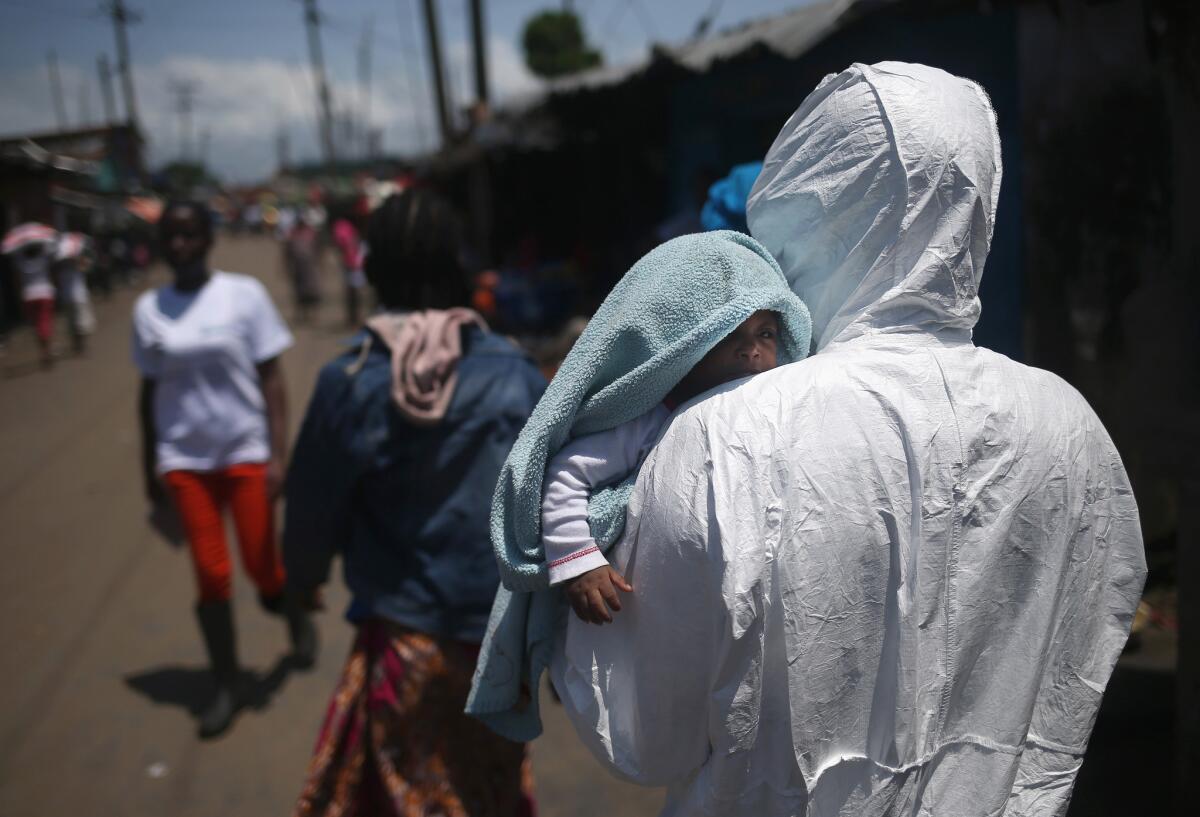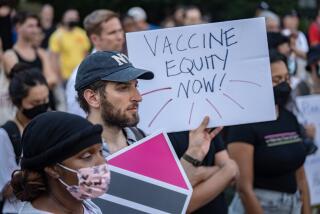The harsh truth about an Ebola vaccine: It’s not so simple

- Share via
The popular instinct about the potential of vaccines to address the horrific Ebola outbreak in West Africa is: Why delay? If there’s any chance they’ll work, let’s get them out now.
Unfortunately, things aren’t that simple. That was made clear during an emergency conference convened by the World Health Organization at the end of September to address this very issue.
The meeting brought together 70 experts--epidemiologists, public health regulators, pharmaceutical company reps and ethicists, among others--to hash out the right way to proceed with trials of two vaccines that have shown the most promise in private and first-phase human trials.
The meeting underscores the special difficulties of testing a vaccine in the teeth of an ongoing outbreak for which no other remedies are in the offing. What emerged were sharp disagreements over the ethics of some testing strategies, such as randomized trials in which some subjects would receive an Ebola vaccine and a control group would receive some other medicine.
Most participants seemed to agree with WHO’s general recommendation, which is to move almost immediately to phase III tests of the vaccines’ efficacy in Liberia, Guinea and Sierra Leone, the epicenter of the outbreak. “It’s an extraordinary, unprecedented gamble to move so quickly,” according to a report on the conference in Science magazine--”but one that WHO consultants say is warranted by Ebola’s extreme threat.”
In its official communique after the meeting, WHO expressed “the ambition...to accomplish, within a matter of months, work that normally takes from two to four years, without compromising international standards for safety and efficacy.”
Even on an accelerated schedule, efficacy tests are not expected to begin until January, or even February. That’s when 20,000 doses will be available of the most advanced candidate, a vaccine developed by GlaxoSmithKline in collaboration with the National Institute of Allergy and Infectious Diseases.
The vaccine has been shown to work in primates and is expected to be safe, and early data on its immunogenic properties in humans--that is, whether it fosters the creation of antibodies or an immune response--are expected within a few weeks, says Ira Longini, a biostatistician at the University of Florida who attended the WHO conference. But even if the immunogenic response is good, it doesn’t mean vaccine takers are necessarily protected--that requires the further testing.
Much of the discussion at the WHO meeting concerned the ethics of various formats of human trials, especially randomized controlled trials, in which some subjects would be given an alternative medicine--not a placebo, in this case, but another antiviral that would provide some protection from infection, if not specifically from Ebola.
A format preferred by some attendees is a “stepped-wedge” trial, in which all subjects will receive the vaccine, but at different times. Since the supply of test vaccines will be limited in any case, the stepped-wedge format doesn’t deprive anyone of a vaccine they would otherwise receive. But advocates of the randomized controlled approach say that it produces reliable indications of safety and effectiveness the fastest--and speed is of the essence.
The WHO communique said randomized clinical trials are “the design of choice,” but acknowledged that designs such as stepped-wedged trials “should be considered when [randomized controlled trials] are not judged feasible.” It may be that several trials of different designs will take place at the same time.
Is it ethical to deprive a test subject of a vaccine during an outbreak? Longini says it may be “if there’s nothing we can offer that we can say for sure is effective,” which is the case here. In any event, all subjects would have to be told in advance that they may not be receiving the test vaccine.
But Longini observes that it’s dangerous to assume that because a vaccine seems to work in primates, appears to be safe, and evokes an immune response, it’s effective. It’s not unusual for a drug to meet all those tests, yet prove to be ineffective, or even harmful, in humans. (That happened with an HIV vaccine trial in 2007.)
“The idea of mass vaccinating with a vaccine you know nothing about is pretty scary,” Longini says. But if safety and effectiveness data show that the vaccine is even 40% or 50% effective, he says, it should be rolled out as soon as possible to the control group at least.
One unresolved question is whether a vaccine can be tested and distributed in time to stem the current outbreak, which WHO calls “the most severe acute public health emergency in modern times.”
Some experts say the disease is already so widespread and deadly that a vaccine may be the only way to check it. Front-line healthcare workers and caregivers exposed to the bodily fluids that carry the virus to new victims--”everyone from doctors and nurses to janitors, people who collect the bodies, and gravediggers,” as Science put it--should be among the first in line.
Even on a schedule that doesn’t anticipate phase III human trials to begin until next January at the earliest, with results not expected for as long as six months after that the vaccine may still be timely.
“Unfortunately, it may well be relevant to the current outbreak,” Longini says. “It doesn’t look like the outbreak in West Africa will be over any time soon.”
Keep up to date with the Economy Hub. Follow @hiltzikm on Twitter, see our Facebook page, or email mhiltzik@latimes.com.
More to Read
Inside the business of entertainment
The Wide Shot brings you news, analysis and insights on everything from streaming wars to production — and what it all means for the future.
You may occasionally receive promotional content from the Los Angeles Times.











